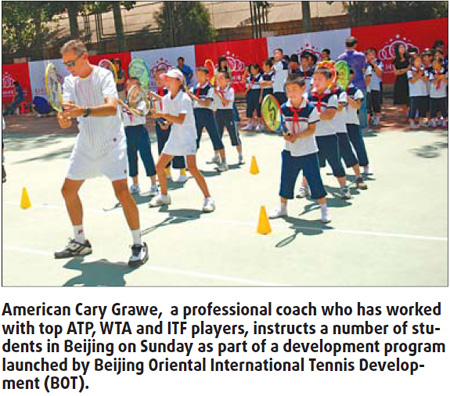
His tanned skin and agile body suggest he has been exercising outdoors a long time.
He sounds like an encyclopedia when talking about the players.
"Federer has always been a source of inspiration, but my style is more like Roddick's. Safin's too irritable, that's what I must avoid."
Jin Zhiyong, the 13-year-old tennis hopeful, won the national men's doubles U/14 title and finished in the top four for his age last year.
As one of the most promising Chinese teenage players, Jin is also helping to increase the popularity of the sport in China.
Serving as a "young coach", he shared his love of tennis with hundreds of students, aged between 6-12, at Beijing Shifoying Elementary School in a promotional program launched by Beijing Oriental International Tennis Development (BOT) on Sunday morning.
"Today, there are many more kids playing tennis than just a few years ago, when I was a starter.
"And I believe more students will get involved in the sport in the coming years. That's great."
Playing tennis is actually not something new any more to a great number of the pupils.
He Zengxu, a fourth-grader who has played his father for an hour or two every day since late 2007, is a big fan of the sport and has been glued to the television for the ongoing French Open.
"I love the weekends even more as I can watch the matches until as late as I want," he enthused.
Increasing participation at the grassroots level bodes well for China's tennis success.
The last decade has witnessed great leaps by Chinese players, especially women, into world-class competition.
Sun Tiantian and Li Ting gave China its first taste of tennis success on the world stage by taking gold in women's doubles at the 2004 Athens Olympics before Zheng Jie and Yan Zi won the Australian Open and Wimbledon Open in 2006.
Zheng also chalked up impressive personal achievements, becoming the first Chinese Grand Slam semifinalist in London last year and shooting up the rankings to world No 15 in May.
Her success didn't escape the notice of Jin, although he fears it's harder for China's men to emulate her success.
Nor did Zheng's achievements fail to draw the attention of other kids and their parents.
Training clinics in schools have sprung up all over China in the past few years.
Although still well short of demand, Beijing is now home to more than 2000 tennis courts.
"Thanks to international achievements by our women's tennis players, the sport has gained great popularity," Zhang Yaorong, the director of BOT said.
"There are Zheng Jie and Li Na, but there should be more and more players emerging all the time."
About 6 million people now play tennis in China, less than half of 1 percent of the population, compared to 25.1 million in the United States, a figure that represents 8.3 percent of the nation's population.
"The long-term development of the sport depends on a huge pool of young players. That is why we are trying to bring the sport into every school, even kindergartens," Zhao said.
(China Daily June 3, 2009)